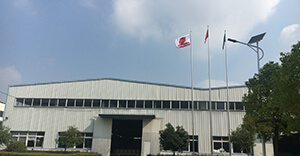lithium solution reduced the total cost of inventory ownership in Mexico by 32%
The switch to forklift lithium batteries as the main power source saved hundreds of man-hours in labor, increased uptime, and improved safety, providing an efficiency boost to the distribution center operations.
The industry drive for the continuous specialization of equipment, automation of operations, and improvement of safety standards rely more and more on lithium battery manufacturers. But how can material handling companies better harness these trends and achieve higher operational efficiency with the use of Li-ion power?
In 2021, Mabe-General Electric, Mexico's largest home appliance manufacturer, is struggling to cope with the growing workforce related to the routine maintenance of lead-acid forklift batteries. Mabe is a company which designs, produces, and distributes appliances to more than 70 countries around the world. Regular interruptions in operations due to batteries not being recharged on time for shifts can reduce uptime and affect productivity. Charging is also a problem, as in some cases the battery is only half recharged in 5-6 hours. A driver could come back from lunch to find his truck battery still in need of at least another hour of charge to last him through the rest of the shift. Not only was productivity adversely affected and overtime pay piled up, but safety was compromised as well. The slippery floor from a mix of water and acid spills and strong odor from the heated batteries became real work environment issues. Added to this were the occasional acid spills that damaged the floor finish and the trucks, creating slippery, hazardous, corrosive conditions. Routine maintenance had ultimately expanded to two hours of added labor daily.

Safety and hygiene standards
Many warehouses and distribution centers are required to maintain the most stringent hygiene standards to meet the requirements of food and beverage, wine, pharma, and medical supply manufacturers. Li-ion technology provides a safe, non-toxic power source for warehouses of all types, as these batteries produce no pollutants. Conventional lead-acid batteries, while widely used throughout the material handling industry in electric lift trucks, pose toxic risks and real issues due to possible acid spills and fumes. These common safety issues are often the result of overheating while charging or simple human error in the course of daily maintenance.
Because Li-ion batteries charge much faster than conventional lead-acid types, with opportunity charging, Li-ion-powered units are able to run 24 hours a day, 7 days a week without the need to stop during a shift and change the batteries.
Not only does this eliminate battery swap tasks, it also frees up space in DCs that otherwise need to carve out a battery room. With a trend in the industry toward smaller fulfillment centers located close to customer concentrations, this space-saving nature of Li-ion should increase its adoption.
When Alex-the Mexico distributor from BSLBATT, introduced facility management to the new lithium-ion technology, the warehouse supervisor was interested but also worried about possible technology transfer issues and the cost of transiting to the new lithium-ion technology. The team conducted a field visit to another BSL Batteries customer who had been using a similar truck and had made the transition earlier and successfully -- Outsourcing CM Company, Colombia.
On top of that, these batteries maintain a constant voltage and don’t entail tasks like battery watering. Overall, Vivian Chen advises that users should assess the total cost of ownership for Li-ion and give them close consideration as they expand their fleets or retire older electric lift trucks. “With all the benefits and advantages that come with having an integrated lithium-ion battery, I expect we will see more forklifts with integrated lithium-ion batteries,” says Vivian Chen.
Adoption of automation
Modern lithium battery management systems are Wi-Fi enabled and provide fleet managers with reliable data on each lift truck’s battery performance, including energy throughput, the timing of charging events, and multiple indicators of battery health. This data by itself provides valuable insight for better equipment utilization and can be further integrated with warehouse management software analytics.
The management was sold on the idea and supported the move to the new technology.
The switch to the new Li-ion batteries was smooth and did not require any operational infrastructure changes. The results were immediate – zero daily maintenance of batteries, reliable operations, and a 32 percent reduction of the total cost of ownership of the inventory. The company has reportedly made the decision to use Lithium Ion exclusively in all locations going forward.
The warehouse supervisor was also pleased to find out that the chargers were 4 times smaller for Li-ion batteries and were wall-mounted. This eliminated the risk of riding a truck into a charging stand.

More Energy Efficient With No-Water Maintenance and Increased Safety
For many managers and supervisors who are concerned with productivity, the no-water maintenance factor of lithium-ion batteries makes a switch from lead-acid an easy decision.
When you add lithium-ion stable cell battery chemistry and an overall 40% total efficiency improvement, 30% for walkies and 50% for class 1 forklifts, the future of the material handling and ground support equipment industries is on a path to reduced costs and environmentally friendly technologies.
We help reduce your costs and improve your productivity.
Can Lithium-Ion Technology Work For You?
By now you will have realized that lithium-ion batteries are the future of forklift and AGV equipment. The return on investment, increased productivity and fewer maintenance requirements make it the logical choice for hundreds of businesses.













